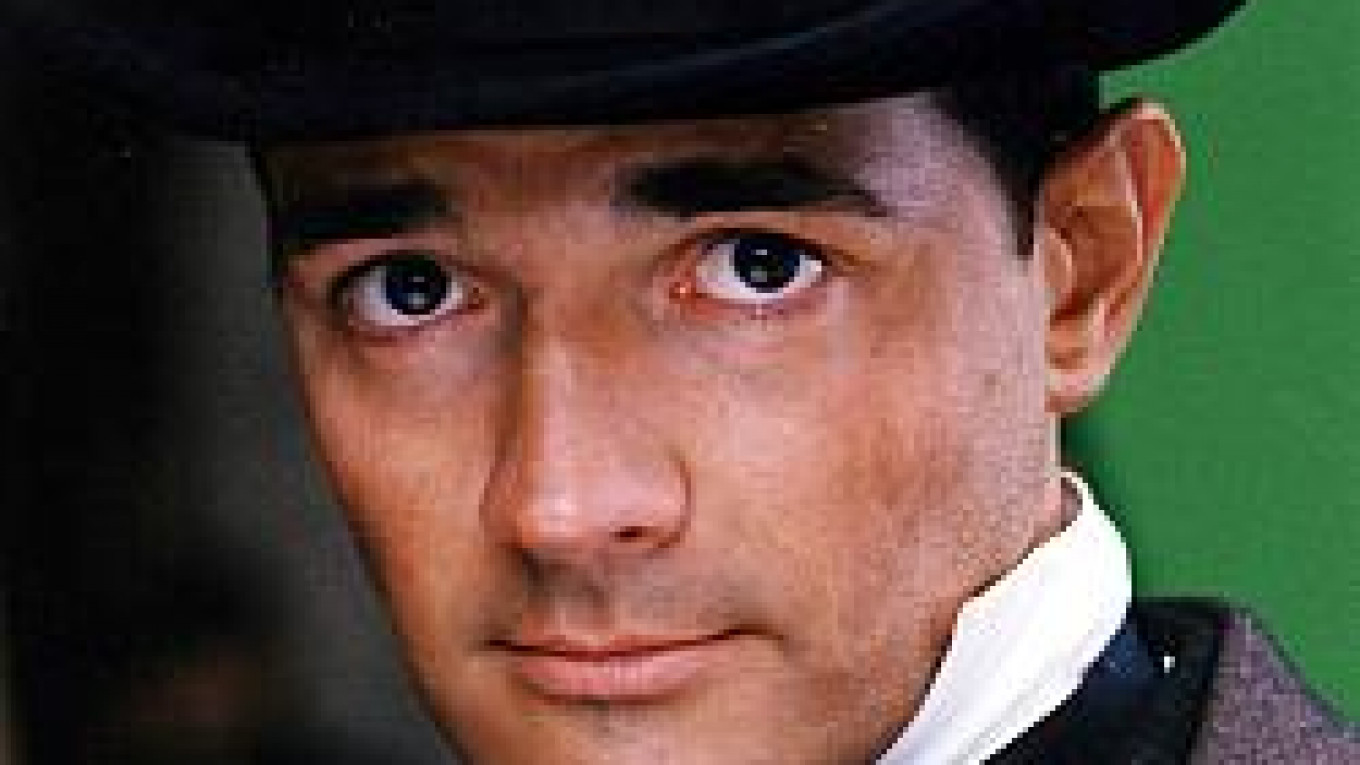That, however, is where the similarities between the two films end. While "Night Watch" was a contemporary Moscow fantasy-thriller, "Gambit" is a more conventional historical adaptation -- one which will perhaps be confusing to some of the youth audience that is so central to blockbuster success in Russia.
Not that Faisiyev and his Channel One producers don't try their best to please the younger crowd, particularly with some fast and energetic cutting and some impressive visual effects. The fact that the film is an adaptation of the second novel in Boris Akunin's wildly popular Erast Fandorin series can also only help. The first novel, "Azazel," or "The Winter Queen" in its English translation, was adapted for television by Channel One several years ago, although the prevailing reaction among critics was that it didn't live up to expectations. In this case, the novelist himself wrote the screenplay.
"Gambit" sees Fandorin the detective (played impressively by Yegor Beroyev, first seen in a lead role in Vladimir Mashkov's "Papa" last year) move toward the challenges of wartime espionage. It's 1877, and the Russo-Turkish war is in full swing, as is the conflict for dominance in Bulgaria (where most of the landscapes were shot). Specifically, it is a moment of impending conflict over the town of Plevna, which will go on to play a crucial role in the war's resolution.
When a leak from the Russian general staff leads to an unexpected diversion of troops away from the town, Fandorin steps in to unearth the mole. He's faced with a strange bunch of candidates -- indeed, there are moments when the camp seems to have the atmosphere of a social club, rather than a military command headquarters. Alongside a clutch of suspicious foreign journalists covering the conflict, there is also the beautiful Varvara Suvorova (Olga Krasko), who has arrived to reunite with her husband-to-be -- by no coincidence, the code-man whose presumed error led to the Plevna problem.
All, somewhat predictably, is not what it seems, given the wiles of some of the Turkish players (cult Russian star Gosha Kutsenko is memorable in one such role). And alongside the scenes of intrigue and conflict, there is also potential love interest ready to burst between Fandorin and Suvorova.
The film is sometimes a strange and rather uneven mixture between different plot elements. Perhaps it is no accident that the executive producers behind "Gambit" were from Nikita Mikhalkov's Tri-Te studio; there is a sense of some visual and thematic links with Mikhalkov's 1998 film "The Barber of Siberia" -- and that's not always positive, since that picture also seemed unable to make up its mind about what genre it was aiming for.
Aside from a common visual style, the two films were both edited by the Italian Enzo Meniconi, another former Mikhalkov collaborator. Here at least he's more compact, if sometimes rather too energetic, bringing in "Gambit" at around two hours, while the all-too-stately "Barber" ran to almost three. The score by Andrei Feofanov and Goran Bregovic, a past composer for Bosnian director Emir Kusturica and other major European directors, takes some tips from Kusturica to jazz up the action, arguably too energetically at times. There are moments that are just, well, very loud.
Visually, there's much to enjoy, from long landscape shots of the camp and conflict (which are largely created with special effects, as are the Plevna townscapes) to close-ups of the characters' faces that are a credit to cinematographer Andrei Zhegalov. The design work by Vladimir Svetozarov and others also comes in strongly.
The supporting cast is all accomplished, including the likes of Alexander Baluyev, Marat Basharov and Dmitry Pevtsov, as well as Polish veteran Daniel Olbrychski. Whether the film jells as a whole is another matter, though. In any case, Boris Akunin is set to remain prominent this year, since director Filipp Yankovsky will shortly release an adaptation of another Erast Fandorin novel, "The State Counselor."
"Turkish Gambit" (Turetsky Gambit) is playing at theaters citywide.
A Message from The Moscow Times:
Dear readers,
We are facing unprecedented challenges. Russia's Prosecutor General's Office has designated The Moscow Times as an "undesirable" organization, criminalizing our work and putting our staff at risk of prosecution. This follows our earlier unjust labeling as a "foreign agent."
These actions are direct attempts to silence independent journalism in Russia. The authorities claim our work "discredits the decisions of the Russian leadership." We see things differently: we strive to provide accurate, unbiased reporting on Russia.
We, the journalists of The Moscow Times, refuse to be silenced. But to continue our work, we need your help.
Your support, no matter how small, makes a world of difference. If you can, please support us monthly starting from just $2. It's quick to set up, and every contribution makes a significant impact.
By supporting The Moscow Times, you're defending open, independent journalism in the face of repression. Thank you for standing with us.
Remind me later.


